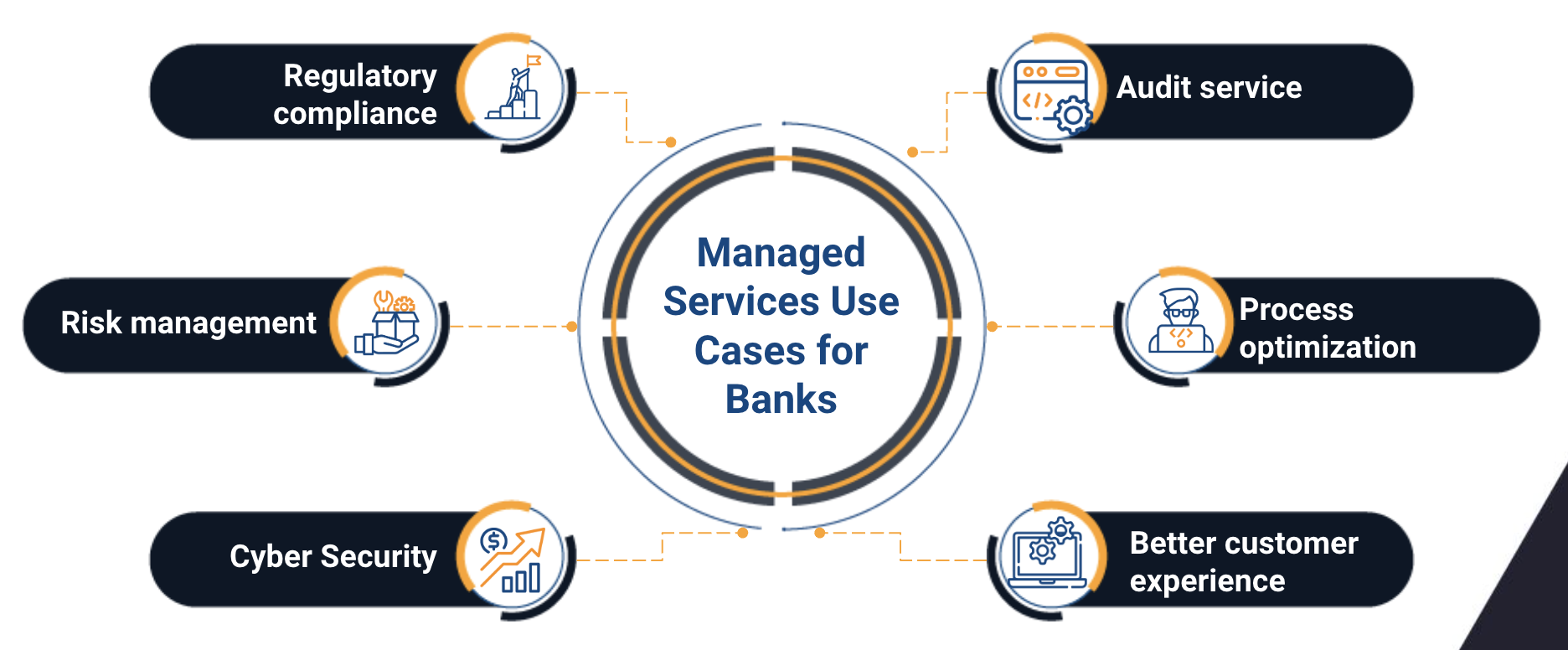
Managed Services for the Banking Industry: Use Cases
October 29, 2024
Table of contents
Quick Access

The banking industry faces significant challenges in managing business-critical processes, especially in areas such as regulatory compliance, cybersecurity and risk management. These processes require not only extensive resources, but also specialized skills and advanced technologies.
The increase in regulatory compliance costs, which reach almost $270 billion annually, is a clear example of the burden that these challenges represent. In this context, managed services emerge as a strategic solution so that banks can focus on their key objectives, leaving the management of specialized and complex functions in the hands of experts.
Managed Services use cases for the banking industry
1. Regulatory Compliance
One of the main areas where managed services are of great value to banks is in regulatory compliance. Following the financial crisis, banking institutions have significantly increased their compliance teams and have also turned to external consultancies, spending close to $200 billion. However, this approach has proven to be inefficient and costly.
Managed services offer a more scalable and effective alternative by providing specialized expertise and technology that reduces the need to expand internal compliance teams, as noted in a Deloitte study.
By outsourcing tasks such as auditing and compliance reporting, banks can benefit from the expertise of a provider that already has proven systems and access to intellectual property and advanced technology. These services can also quickly adapt to regulatory changes, ensuring that the bank is always up to date without the need for large internal investments.

2. Risk Management
Risk management is another crucial area where managed services provide significant benefits. A specialized managed services provider can implement a proactive approach to risk defense and response, including everything from vulnerability assessments to threat intelligence analysis. This proactive approach allows banks to reduce risks before they materialize, something that would be difficult to achieve with a limited in-house team.
In addition, a long-term relationship with a managed services provider allows the provider to become deeply integrated into the bank's operations, gaining continuous knowledge about its specific risks and adjusting its services to the institution's changing needs. This creates a more robust and adaptable risk management system that not only detects problems, but also responds with fast and effective solutions.
3. Cybersecurity
In today's digital environment, cybersecurity is essential for banks, as they are constantly exposed to security threats. Rather than relying solely on reactive methods, managed services can offer a more comprehensive and proactive solution in protecting against cyberattacks, they noted in the same Deloitte report.
A cybersecurity managed services provider can bring a wide range of tools to the table, including threat analysis, incident response, breach remediation, and identity management.
These services not only focus on notifying the bank of a potential threat, but also provide a specialized team that can execute a comprehensive cybersecurity strategy. This team has skills and knowledge that are continually updated, allowing the bank to always be prepared for new types of attacks and vulnerabilities.
This long-term relationship is especially valuable, as the managed services provider is committed to the client's success, dedicating its best resources to achieve the expected results.

4. Managing internal and external audits
Another area where managed services are valuable is in managing audits, both internal and external. Audits are essential to comply with regulations and to detect areas for improvement within the bank's operations. However, managing the audit process can be complex and costly. By outsourcing this function to a managed service provider with experience in the banking sector, the bank can ensure that its audits are conducted with rigor and efficiency.
Managed service providers can provide a team of trained professionals who are experienced in working with regulators and in meeting the required standards. Not only does this reduce the burden on the internal team, but it also improves the transparency and accuracy of audits. In addition, the managed service provider can adapt audit processes to changes in regulations, keeping the bank compliant without interruption.
5. Optimizing operational processes
Banks can also benefit from managed services to optimize their operational processes. From data management to process automation, managed service providers can offer advanced technology solutions that simplify and improve the efficiency of the bank's operations. These services allow the bank to reduce operating costs and improve the quality of its services without the need for large investments in infrastructure or internal technology.
In addition, managed service providers typically have a team that has a deep understanding of the operational processes of various banks, allowing them to implement best practices and optimization strategies that have proven effective at other institutions. This approach not only improves operational efficiency, but also allows the bank to focus on its growth and the innovation of its products and services.

Selecting a Managed Services Provider for the Banking Sector
Choosing a suitable managed services provider is critical to the success of a bank’s outsourcing strategy. Some key factors to consider include:
- Banking sector experience: It is essential that the provider has a proven track record in the banking sector and is familiar with compliance, risk and audit requirements.
- Staff quality and access to technology: The provider should have a high-quality team and access to advanced technologies that cover the bank’s internal knowledge gaps.
- Credibility and reputation: The provider’s reputation with other industry players, including regulators and technology providers, is key to establishing a trusted relationship.
- Global coverage: For global banks, it is important that the provider has an international presence and can handle the complexities of regulations in multiple jurisdictions.
Managed services are a strategic solution for banks facing complex and costly challenges in key areas such as regulatory compliance, cybersecurity, risk management and process optimization.
By working with a trusted provider, banks can access expertise, technology and innovative practices that not only improve their operational efficiency, but also enable them to proactively respond to changes in the regulatory and threat environment.
Choosing the right provider and effectively managing the implementation of these services is crucial to maximizing benefits and ensuring long-term success in the banking industry.
We recommend you this video
Related Blogs

Importance of an insurance quote portal

Features of an insurance claims management portal

Banking software provider to prevent financial crimes

Why create a banking portal for customers?

Banking fraud detection and prevention with AI

